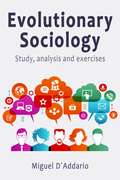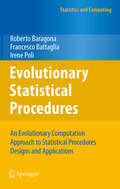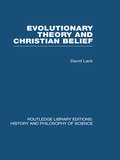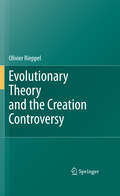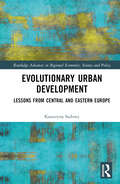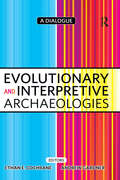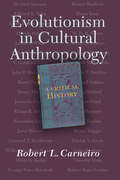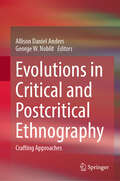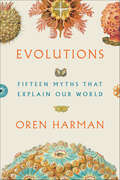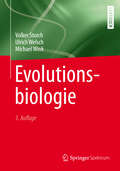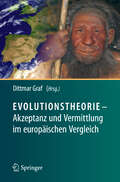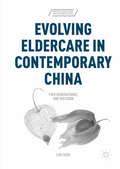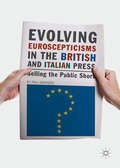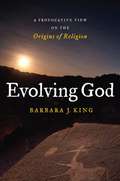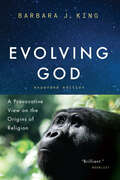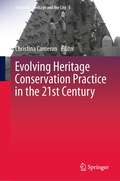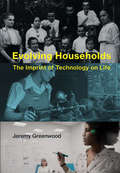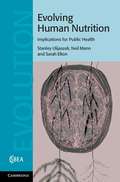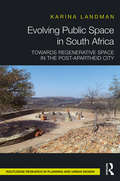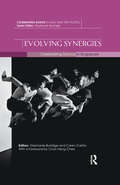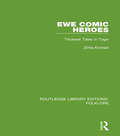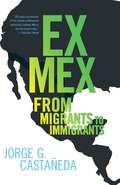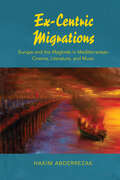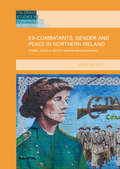- Table View
- List View
Evolutionary Sociology
by Miguel D'AddarioThe most basic idea that underlies the concept of structure is that reality is not chaos. The skeleton of a living being is its bony system. The structure of a building is given in the way beams, floors, spaces, etc. are arranged. One of the most important influences in shaping the concept of structure in the sociology comes from Marxist thought in which there has been a sharper structural image of society.
Evolutionary Statistical Procedures
by Irene Poli Roberto Baragona Francesco BattagliaThis proposed text appears to be a good introduction to evolutionary computation for use in applied statistics research. The authors draw from a vast base of knowledge about the current literature in both the design of evolutionary algorithms and statistical techniques. Modern statistical research is on the threshold of solving increasingly complex problems in high dimensions, and the generalization of its methodology to parameters whose estimators do not follow mathematically simple distributions is underway. Many of these challenges involve optimizing functions for which analytic solutions are infeasible. Evolutionary algorithms represent a powerful and easily understood means of approximating the optimum value in a variety of settings. The proposed text seeks to guide readers through the crucial issues of optimization problems in statistical settings and the implementation of tailored methods (including both stand-alone evolutionary algorithms and hybrid crosses of these procedures with standard statistical algorithms like Metropolis-Hastings) in a variety of applications. This book would serve as an excellent reference work for statistical researchers at an advanced graduate level or beyond, particularly those with a strong background in computer science.
Evolutionary Theory and Christian Belief: The Unresolved Conflict (Routledge Library Editions: History & Philosophy of Science)
by David LackOriginally published in 1957. This book is concerned with the conflict between "Darwinism" as the Victorians called it, and Christianity, a conflict here re-stated in modern terms because it so vitally affects our understanding of human nature and human values today. The opening chapter describes the historical background. There is a short account of evolution and the argument over Genesis. The importance of natural selection is stressed, and rival theories as to the means of animal evolution are criticised. Discussions follow on whether the course of evolution has been random or determined, on the argument from design, death in nature, the biologist’s methods and the difficulties in evolutionary ethics.
Evolutionary Theory and the Creation Controversy
by Olivier RieppelEvolutionary theory addresses the phenomenon of the origin and diversity of plant and animal species that we observe. In recent times, however, it has become a predominant ideology which has gained currency far beyond its original confines. Attempts to understand the origin and historical development of human culture, civilization and language, of the powers of human cognition, and even the origin of the moral and ethical values guiding and constraining everyday life in human societies are now cast in an evolutionary context. In "Evolutionary Theory and the Creation Controversy" the author examines evolutionary theory from a historical perspective, explaining underlying metaphysical backgrounds and fundamental philosophical questions such as the paradoxical problem of change, existence and creation. He introduces the scientists involved, their research results and theories, and discusses the evolution of evolutionary theory against the background of Creationism and Intelligent Design.
Evolutionary Urban Development: Lessons from Central and Eastern Europe (Routledge Advances in Regional Economics, Science and Policy)
by Katarzyna SadowyDrawing on a range of disciplinary approaches, this monograph explores the drivers of urban development. Through an evolutionary lens, cities are shown to find a development path amidst an ever-changing landscape, sometimes facing extreme externalities such as wars and economic crises. Key themes covered include urban growth, decentralization, path dependence, institutional change, governance, entrepreneurship and culture. Detailed case studies of the history-rich metropolises of Berlin, Budapest and Warsaw allow the author to examine the adaptive abilities of cities in flux, and draw conclusions with broader international relevance. This monograph will be valuable reading for advanced students and researchers in urban economics, evolutionary economics, institutional economics and Central European studies.
Evolutionary and Interpretive Archaeologies: A Dialogue (UCL Institute of Archaeology Publications)
by Ethan E. Cochrane Andrew GardnerThis collection of original articles compares various key archaeological topics—agency, violence, social groups, diffusion—from evolutionary and interpretive perspectives. These two strands represent the major current theoretical poles in the discipline. By comparing and contrasting the insights they provide into major archaeological themes, this volume demonstrates the importance of theoretical frameworks in archaeological interpretations. Chapter authors discuss relevant Darwinian or interpretive theory with short archaeological and anthropological case studies to illustrate the substantive conclusions produced. The book will advance debate and contribute to a better understanding of the goals and research strategies that comprise these distinct research traditions.
Evolutionism In Cultural Anthropology: A Critical History
by Robert L. CarneiroExamines the history of evolutionism in cultural anthropology, beginning with its roots in the 19th century, through the half-century of anti-evolutionism, to its reemergence in the 1950s, and the current perspectives on it today. No other book covers the subject so fully or over such a long period of time.. Evolutionism and Cultural Anthropology traces the interaction of evolutionary thought and anthropological theory from Herbert Spencer to the twenty-first century. It is a focused examination of how the idea of evolution has continued to provide anthropology with a master principle around which a vast body of data can be organized and synthesized. Erudite and readable, and quoting extensively from early theorists (such as Edward Tylor, Lewis Henry Morgan, John McLennan, Henry Maine, and James Frazer) so that the reader might judge them on the basis of their own words, Evolutionism and Cultural Anthropology is useful reading for courses in anthropological theory and the history of anthropology. 0813337666 Evolutionism in Cultural Anthropology : a Critical History
Evolutions in Critical and Postcritical Ethnography: Crafting Approaches
by George W. Noblit Allison Daniel AndersMoving beyond traditional critical ethnography, postcritical ethnographies accept as a key premise that studies which are critical of the social world must also turn critique back on the ethnographer, the study, and its process. The book includes an introduction to the evolutions of critical ethnography and postcritical ethnography and exemplar chapters from contributors who engaged in long-term ethnographic studies. Accompanying each chapter is an introductory preface and margin notes created by the editors to underscore the methodological ‘moves’ made by each author. Addressing the distinct orientations critical and postcritical ethnographies take, the book illuminates how different authors think, enact, and represent their critical and postcritical/post-critical work. In this way the book is pedagogical within and across each chapter. Each contributor has produced a chapter that includes a brief summary of their respective long-term inquiry project with emphases on relation in the being, doing, and theorizing of qualitative research. Contributors discuss their navigation of commitments across the arc of their research and engage critical social theory, interrogating issues of power and ideology. Each chapter includes retrospective analytical reflections on the long-term ethnographic work contributors completed. The chapters address interpretivist commitments to emic analyses, metaphor, and representation and each contributor’s personal and professional commitments to equity and justice. The chapters engage critical social theories, crip horizons, critical race theory, and queer theory, as well as critical and queer pedagogies, de/colonialism, and post-humanism. A summary chapter addresses key issues in contemporary postcritical/post-critical qualitative research. The book is designed to prepare novice qualitative researchers to craft, conduct, and represent postcritical/post-critical qualitative research. The book provides guidance for researchers who are interested in social critique, equity, and justice and who seek to avoid the failures in the last quarter of the 20th Century of critical ethnography.
Evolutions: Fifteen Myths That Explain Our World
by Oren Harman“An absolute joy to read . . . it is Harman’s skill in blending contemporary science and traditional storytelling that makes this book truly brilliant.” —Randy Rosenthal, New York Journal of BooksWe no longer think, like the ancient Chinese did, that the world was hatched from an egg, or, like the Maori, that it came from the tearing-apart of a love embrace. The Greeks told of a tempestuous Hera and a cunning Zeus, but we now use genes and natural selection to explain fear and desire, and physics to demystify the workings of the universe.Science is an astounding achievement, but are we really any wiser than the ancients? Has science revealed the secrets of fate and immortality? Has it provided protection from jealousy or love? There are those who believe that science has replaced faith, but must it also be a death knell for mythology?Evolutions brings to life the latest scientific thinking on the birth of the universe and the solar system, the journey from a single cell all the way to our human minds. Reawakening our sense of wonder, Oren Harman uses modern science to create new and original mythologies. Here are the earth and the moon presenting a cosmological view of motherhood, a panicking mitochondrion introducing sex and death to the world. Science may not solve our existential puzzles, but like the age-old legends, its magical discoveries can help us continue the never-ending search.“Breathtaking . . . The processes of evolution are at times so huge and ungraspable for the mind—so magical—that they can perhaps only be fathomed through the language of myth . . . Brilliant.” —Karin Altenberg, Wall Street Journal“Harman is a marvelous intellectual companion.” —David B. Green, Haaretz
Evolutionsbiologie
by Michael Wink Volker Storch Ulrich WelschDie gut eingeführte "Evolutionsbiologie" von Volker Storch, Ulrich Welsch und Michael Wink liegt inzwischen in 3., sehr gründlich überarbeiteter und aktualisierter Neuauflage vor. Die Autoren schildern den bisherigen Ablauf der Evolution der Organismen durch die Jahrmillionen, die molekularen Grundlagen der Evolution und - unter verschiedenen Aspekten - die Evolution des Menschen und seiner nächsten Verwandten. Zahlreiche Exkurse, viele von renommierten Wissenschaftlern verfasst, erläutern besonders aktuelle Themen.
Evolutionsbiologie
by Michael Wink Volker Storch Ulrich WelschDie gut eingeführte "Evolutionsbiologie" von Volker Storch, Ulrich Welsch und Michael Wink liegt inzwischen in 3., sehr gründlich überarbeiteter und aktualisierter Neuauflage vor. Die Autoren schildern den bisherigen Ablauf der Evolution der Organismen durch die Jahrmillionen, die molekularen Grundlagen der Evolution und - unter verschiedenen Aspekten - die Evolution des Menschen und seiner nächsten Verwandten. Zahlreiche Exkurse, viele von renommierten Wissenschaftlern verfasst, erläutern besonders aktuelle Themen.
Evolutionstheorie - Akzeptanz und Vermittlung im europäischen Vergleich
by Dittmar GrafDie Evolutionstheorie hat sich in den letzten 150 Jahren von einer speziellen naturwissenschaftlichen zur universellen wissenschaftlichen Theorie entwickelt. Sie bezieht Phänomene von der Lebensentstehung bis zu den kulturellen und geistigen Entwicklungen des Menschen ein. Die Evolutionstheorie ist das Fundament der modernen Biologie. Dennoch ist sie bis heute die vermutlich umstrittenste Theorie der Menschheitsgeschichte. Ein großer Teil der Menschen in aller Welt lehnt sie bis heute vehement ab. Das Buch nähert sich diesem Phänomen, indem es einerseits einen interdisziplinären Einblick in die evolutionäre Forschung ermöglicht und damit Wissenschaftler aus unterschiedlichen Disziplinen die Möglichkeit bietet, über ihre Forschung zu berichten. Andererseits schildern Forscher aus verschiedenen europäischen Ländern die spezifischen Schwierigkeiten bezüglich der Akzeptanz der Evolutionstheorie.
Evolving Eldercare in Contemporary China
by Lin ChenWith an increasing number of elders moving into nursing homes, the shift from family to nursing home care calls for an exploration of caregiving decision-making in urban China. This study examines how a rapidly growing aging population, the one-child policy, and economic reform in urban China pose unprecedented challenges to the country's ingrained tradition of family caregiving. It presents interviews of matched elders and their children from a government-sponsored nursing home in Shanghai and analyzes the decision-making process of institutionalization. This book offers fresh insight into the evolving culture and arrangements of caregiving in contemporary Chinese society, illuminating the diverse needs for long-term care of Chinese elders-the world's largest aging population-in the coming decades.
Evolving Euroscepticisms in the British and Italian Press
by Paul RowinskiThis book argues that the discursive construction of the EU in national newspapers is pivotal in creating an environment of Euroscepticism. The volume challenges the persuasive, manipulative and prejudicial language that is sometimes peddled in the influential UK Murdoch and Italian Berlusconi press, using the main focus points of the key Eurosceptic triggers of the € the subsequent national economic crises; and immigration, investigated through major events covered over two decades, including the UK's recent Brexit vote and Italy's constitutional crisis. Rowinski looks at the latest chapter of Euroscepticism: the increasingly key protagonists of the UK Independence Party and Italy's Five Star Movement, who want to take Britain out of the EU and Italy out of the euro. This book offers a rigorous academic analysis presented in an accessible style to experts and laypersons alike, exploring concrete articulations of Euroscepticism in the press.
Evolving God
by Barbara J. KingThis cutting-edge book—with echoes of both Jane Goodall and Joseph Campbell—adds a fascinating new dimension to the debate about the origins of religion. The study of evolution has uncovered invaluable information about many aspects of human behavior and culture, from the physiology of our bodies and brains to the development of hunting, technology, and social groups. But an understanding of the intangibles of human experience, especially religion, lags far behind. Attempts to discover the source of ...
Evolving God: A Provocative View on the Origins of Religion, Expanded Edition
by Barbara J. KingReligion has been a central part of human experience since at least the dawn of recorded history. The gods change, as do the rituals, but the underlying desire remains—a desire to belong to something larger, greater, most lasting than our mortal, finite selves. But where did that desire come from? Can we explain its emergence through evolution? Yes, says biological anthropologist Barbara J. King—and doing so not only helps us to understand the religious imagination, but also reveals fascinating links to the lives and minds of our primate cousins. Evolving God draws on King’s own fieldwork among primates in Africa and paleoanthropology of our extinct ancestors to offer a new way of thinking about the origins of religion, one that situates it in a deep need for emotional connection with others, a need we share with apes and monkeys. Though her thesis is provocative, and she’s not above thoughtful speculation, King’s argument is strongly rooted in close observation and analysis. She traces an evolutionary path that connects us to other primates, who, like us, display empathy, make meanings through interaction, create social rules, and display imagination—the basic building blocks of the religious imagination. With fresh insights, she responds to recent suggestions that chimpanzees are spiritual—or even religious—beings, and that our ancient humanlike cousins carefully disposed of their dead well before the time of Neandertals. King writes with a scientist’s appreciation for evidence and argument, leavened with a deep empathy and admiration for the powerful desire to belong, a desire that not only brings us together with other humans, but with our closest animal relations as well.
Evolving Heritage Conservation Practice in the 21st Century (Creativity, Heritage and the City #5)
by Christina CameronThis book focuses on current trends in cultural heritage conservation and their influence on heritage practice. Seen through the lenses of World Heritage, historic urban landscapes, heritage tourism, climate change or the nature/culture nexus, these challenges call for innovative approaches to protect and conserve our heritage places. The book brings together the voices of different stakeholders in the heritage conservation process, ranging from scholars, site managers and government officials to young professionals and students.
Evolving Households: The Imprint of Technology on Life (The\mit Press Ser.)
by Jeremy GreenwoodThe transformative effect of technological change on households and culture, seen from a macroeconomic perspective through simple economic models.In Evolving Households, Jeremy Greenwood argues that technological progress has had as significant an effect on households as it had on industry. Taking a macroeconomic perspective, Greenwood develops simple economic models to study such phenomena as the rise in married female labor force participation, changes in fertility rates, the decline in marriage, and increased longevity. These trends represent a dramatic transformation in everyday life, and they were made possible by advancements in technology. Greenwood also addresses how technological progress can cause social change.Greenwood shows, for example, how electricity and labor-saving appliances freed women from full-time household drudgery and enabled them to enter the labor market. He explains that fertility dropped when higher wages increased the opportunity cost of having children; he attributes the post–World War II baby boom to a combination of labor-saving household technology and advances in obstetrics and pediatrics. Marriage rates declined when single households became more economically feasible; people could be more discriminating in their choice of a mate. Technological progress also affects social and cultural norms. Innovation in contraception ushered in a sexual revolution. Labor-saving technological progress at home, together with mechanization in industry that led to an increase in the value of brain relative to brawn for jobs, fostered the advancement of women's rights in the workplace. Finally, Greenwood attributes increased longevity to advances in medical technology and rising living standards, and he examines healthcare spending, the development of new drugs, and the growing portion of life now spent in retirement.
Evolving Human Nutrition
by Sarah Elton Neil Mann Stanley UlijaszekWhile most of us live our lives according to the working week, we did not evolve to be bound by industrial schedules, nor did the food we eat. Despite this, we eat the products of industrialization and often suffer as a consequence. This book considers aspects of changing human nutrition from evolutionary and social perspectives. It considers what a 'natural' human diet might be, how it has been shaped across evolutionary time and how we have adapted to changing food availability. The transition from hunter-gatherer and the rise of agriculture through to the industrialisation and globalisation of diet are explored. Far from being adapted to a 'Stone Age' diet, humans can consume a vast range of foodstuffs. However, being able to eat anything does not mean that we should eat everything, and therefore engagement with the evolutionary underpinnings of diet and factors influencing it are key to better public health practice.
Evolving Public Space in South Africa: Towards Regenerative Space in the Post-Apartheid City
by Karina LandmanEvolving Public Space in South Africa discusses the transformation of public space highlighted in the country. Drawing on examples from major cities, the author demonstrates that these spaces are not only becoming wasted space, but are also adapting and evolving to accommodate new users and uses in various parts of the city. This process of evolution tends to challenge the more traditional visions and general global views of declining public space in cities and argues that it rather resembles the resilience of these spaces and the potential for regeneration through continuously emerging and mutating forms, functions and meanings. Including over 20 black-and-white images, this book would be beneficial to academics and students of urban planning and design and those interested in the regeneration of cities.
Evolving Synergies: Celebrating Dance in Singapore (Celebrating Dance in Asia and the Pacific)
by Stephanie Burridge Caren CariñoA comprehensive overview of the dance culture of Singapore, this book embodies storytelling, personal reflections, memories, and histories of the artists. The extensive calendar of events encompassing companies and soloists from diverse dance practices, such as Indian, Malay and Chinese and a variety of Western contemporary dances, underline Singapore as a vibrant player in the evolution of Asian culture.
Ewe Comic Heroes: Trickster Tales in Togo (Routledge Library Editions: Folklore)
by Zinta KonradThe trickster character is prominent in the cultural, particularly narrative, traditions of many different peoples throughout the world. Comic and serious, stupid and clever, benevolent and evil, winner and loser, the trickster is a study in contradictions. The trickster cannot be pigeonholed, for he does not fit into any neat categories or definitions. This study, first published in 1994, aims to give the reader the opportunity to experience in some small measure the dynamic and exciting dramatic oral narrative performances of the Ewe people of West Africa.
Ex Mex
by Jorge G. CastanedaFrom the massive nationwide rally in support of immigrant rights in May 2006 to protests against the increasingly frequent immigration raids across the country, the public debate on immigration reform has largely centered on Mexican immigrants. Yet, in the United States, we rarely hear the Mexican perspective on the issue.In "portraits that defy American stereotypes of who is a Mexican immigrant" (Booklist ), former Mexican foreign minister and eminent scholar Jorge G. Castañeda describes just who makes up the newest generation of immigrants from Mexico, why they have chosen to live in the United States, where they work, and what they ultimately hope to achieve. Drawing on his wide-ranging experience, Casteñeda examines the century-long historical background behind the labor exchange between Mexico and the United States, while offering an insider's account of the official conversations and secret negotiations between the two countries in recent years.Both authoritative and timely, Ex Mex is essential reading for all who want to make sense of the complex issue of immigration.
Ex-Centric Migrations: Europe and the Maghreb in Mediterranean Cinema, Literature, and Music
by Hakim Abderrezak“Plunges the reader into a tour de force across radically divergent artistic responses to Mediterranean migration.” —Bulletin of Francophone Postcolonial StudiesEx-Centric Migrations examines cinematic, literary, and musical representations of migrants and migratory trends in the western Mediterranean. Focusing primarily on clandestine sea-crossings, Hakim Abderrezak shows that despite labor and linguistic ties with the colonizer, migrants from the Maghreb (Morocco, Algeria, and Tunisia) no longer systematically target France as a destination, but instead aspire toward other European countries, notably Spain and Italy. In addition, the author investigates other migratory patterns that entail the repatriation of émigrés. His analysis reveals that the films, novels, and songs of Mediterranean artists run contrary to mass media coverage and conservative political discourse, bringing a nuanced vision and expert analysis to the sensationalism and biased reportage of such events as the Mediterranean maritime tragedies.“Ex-Centric Migrations is crucial reading for scholars and students of contemporary Maghrebi, French, and Spanish literatures and cultures. It breaks new ground by encompassing the literature, film, and music of ‘return migration’ and examining the trajectories of Maghrebi migration outside France.” —H-France“Hakim Abderrezak convincingly illustrates how politically committed artistic practices serve to humanize the challenges of human migration, and in the process dramatically improves our understanding of the complex cultural, economic, political, and social realities that shape 21st-century existence.” —Dominic Thomas, author of Africa and France: Postcolonial Cultures, Migration, and Racism
Ex-Combatants, Gender and Peace in Northern Ireland
by Azrini WahidinThis book explores the contours of women's involvement in the Irish Republican Army, political protest and the prison experience in Northern Ireland. Through the voices of female and male combatants, it demonstrates that women remained marginal in the examination of imprisonment during the Conflict and in the negotiated peace process. However, the book shows that women performed a number of roles in war and peace that placed constructions of femininity in dissent. Azrini Wahidin argues that the role of the female combatant is not given but ambiguous. She indicates that a tension exists between different conceptualisations of societal security, where female combatants both fought against societal insecurity posed by the state and contributed to internal societal dissonance within their ethno-national groups. This book tackles the lacunae that has created a disturbing silence and an absence of a comprehensive understanding of women combatants, which includes knowledge of their motivations, roles and experiences. It will be of particular interest to scholars of criminology, politics and peace studies.
